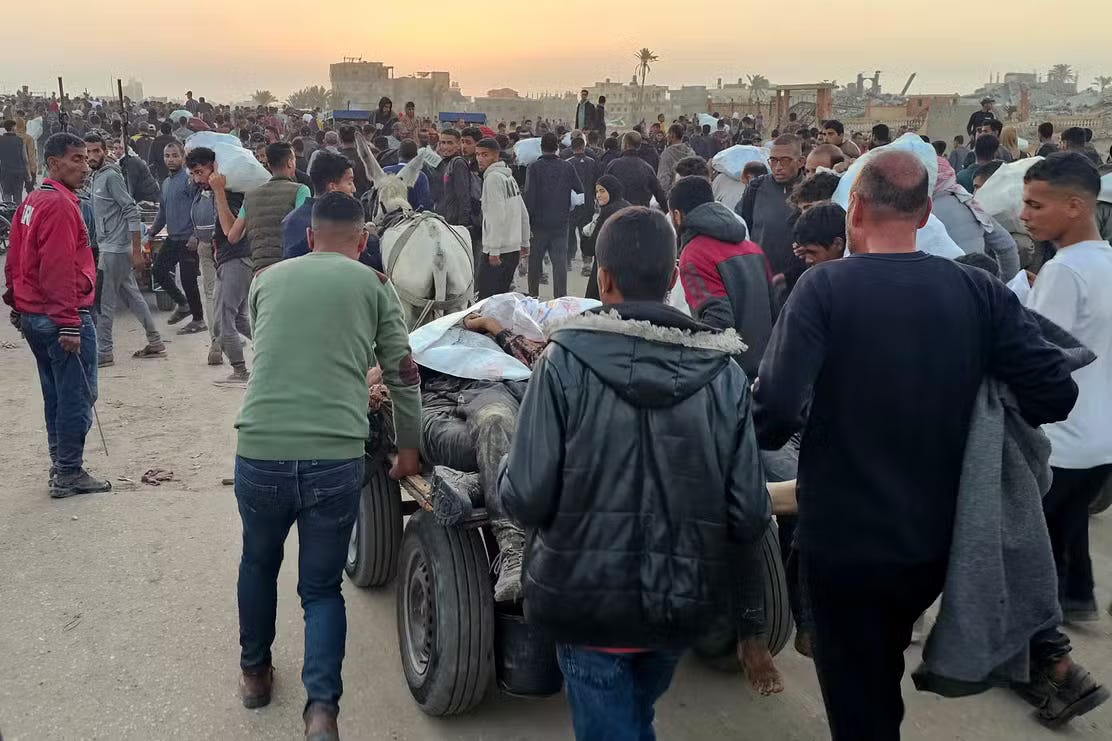Genocidal Inhumanitarianism
Lets stop playing games with the word “human.” By Bhakti Shringarpure.
Aid distribution centers in Gaza have become death traps. Let it sink in: cordoned off and condensed areas where the deliberately starved population of Gaza is lured in order to collect food immediately become sites of mass murder. A dubious Delaware-based American organization called the Gaza Humanitarian Foundation has been tasked with the distribution of aid in Gaza. Backed by the US-Israeli governments, it was set up in February 2025, and since then, over 500 Palestinians have been killed and thousands injured when waiting in the supposed aid distribution areas.
Social media posts, videos and photographs from Palestinians at these sites have started coming in almost daily. Flour mixed with blood, a skeletal man slumped on a cart dead from his trip to get food, groups of people carrying dead people rather than bags of food, and terrorized crowds running as shots ring out in the air.
Documentation and evidence has been piling up for months. As always, the New York Times and other genocide-promoting outlets have been covering it up through obfuscatory headlines and passive voice narration. So blatant is the fact that this is a corrupt and murderous organization in cahoots with the occupation’s army that finally, even an Israeli paper has reported the story. “Israeli soldiers in Gaza told Haaretz that the army has deliberately fired at Palestinians near aid distribution sites over the past month,” it was reported in a widely circulated article.
I have been writing critically about humanitarianism for several years, especially as it pertains to white savior ideologies in Africa, particularly Sudan, and within the context of contemporary migration. With roots in colonial Christianity, humanitarianism has an evangelical fervor and proponents of humanitarianism are armed with good-intentions and do-gooderism so fanatical that its critics are made into villains who are depicted as being comfortable watching people die of war or famine. But a large body of writing exists that contextualizes, historicizes and intervenes in the way that humanitarianism has operated historically and in its many iterations today. I know that international non-governmental organizations have started to take heed of these critiques, as I have even been invited to deliver closed sessions on this topic.
Within the large body of literature on this topic, I have been convinced in recent years by Kelly Oliver’s short book titled Carceral Humanitarianism: Logics of Refugee Detention (2017). Oliver makes several powerful arguments: that refugee camps and detention centers are an integral part of the humanitarian response to the so-called “refugee crisis;” that political rights have been downgraded to “humanitarian favors;” and that humanitarian aid organizations are big businesses in tandem with governments and militaries. She writes that nation-states rely on international humanitarian aid organizations to take care of mass forced migration and refugees, while their militaries police borders to capture, detain, and control the movement of those same people. Thus humanitarianism today has become a "way to control and manage the population” through various long-term forms of incarceration and imprisonment.
Palestine gets almost no mention in the book (typical in Western academia), but Oliver’s words ring true for Palestine when she writes: “At best, refugees are seen as victims in need of rescue; at worst, they are seen as terrorist threats. In Carceral Humanitarianism, I deconstruct this opposition between rescue and security to show how humanitarianism aid as rescue politics operates as the flip side of humanitarian war as security politics.” I would speculate that Oliver could not have foreseen such a direct manifestation of some of her ideas.
In his devastating analysis, Abdaljawad Omar writes: “What is unfolding today in Gaza, where food aid falls from the sky like ordinance and “humanitarian corridors” double as kill zones, is not the collapse of humanitarianism, but its logical consummation under conditions of settler-colonial necropolitics.”
Ammiel Alcalay recalls this settler-colonial necropolitics once again by using the term Gaza death camp where perversity is being taken to new levels. “Palestinians are eliminated mathematically, in categories, through differing forms of cruelty.” Referring to these “aid” kill zones, Alcalay writes: “Enacted upon the self, it consists of doing everything necessary to stay alive - following the "hunger games" of evacuation orders, running between bullets, bombs and missiles, whether fired by snipers, tanks, drones, jets or ships.”
Omar has described these kill zones as ushering in a “new humanitarianism.” He argues that “this is not merely a new war on Gaza. It is a war on the very category of the ‘human’ as it applies to Palestinians, and eventually a remaking that will impact the whole world.”
It is not the human-ness of Palestinians that has ever been at stake. Their humanity is intact; their flesh and blood and strength and beauty and history and culture has shone from time immemorial. Palestinians teach us daily how we can be human. This humanity has also been displayed over and over again in the past two years as we watch with our own eyes the sick efforts of a world erasing them, degrading them, humiliating them. It is them, the colonizers and the killers, who are not fit to be called human anymore.
Lets stop playing games with the word “human.” Call it as you see it. In fact, this is humanitarianism so openly genocidal that it can be only be called inhumanitarianism. Their cannibalism and savagery has become so unhinged, they are the ones who must be banished from the category “human” altogether.
Love and solidarity❤️🔥
Bhakti Shringarpure
Latest on the Radical Books Collective
Literary Anthology Shifts the Narrative on Yemen: Featuring Rim Mugahed & Laura Kasinof
The mythology of the city of Sana’a writes itself: nestled in a valley; the charming, crumbling architecture; the winding alleys; and a history and heritage older than time itself. As Yemen’s largest city and its capital, a literary anthology through the lens of Sana’a seems like a natural choice.
A Debut Novel Explores Anti-Blackness in Sudan: Featuring Reem Gaafar
When a little boy drowns in the Nile, a Sudanese village is forced to confront its racist past in Reem Gaafar’s debut novel A Mouth Full of Salt. Narrated through a choral protagonist, the novel weaves together the lives of villagers who are suddenly beset by a curse: the drowning is followed by another death, and cattle begin to contract a mysterious i…
Yes, we are celebrating Zohran Kwame Mamdani’s victory in New York too.
Watch this absolute banger from the young Palestinian currently going viral on our Instagram.
Why Celebrity Algorithms are Destroying You
The hosts take a critical look at the algorithms ruling our lives on social media and beyond, with a warning to divest from celebrity content and culture that permeates the news cycle, politics, and more. Whereas the early Facebook and Instagram eras were known for curated and bespoke feeds that were personally made for you, social media has largely bec…
Parenting in a time of genocide
I spent the morning making a three-layer banana cake with cream cheese frosting for my teenage son's birthday. It is a complicated recipe that demands time and attention to minutiae. But I was slowed down, and focus was particularly hard to come…










Brilliant.
Am wondering as to the possibility of building coalitions with Radical Collective authors like yourself, and those of us in the academic community, or recently retired?
While the context is situated in Gaza, among the "subhuman" Palestinians and the broader Diaspora, the reality of this Inhumanity is global. My belief is that what is needed is a rhetorical strategy to bridge the gap between the in-situ, localized context, and the global narrative of treating victims of war as subhuman. Also bridging public intellectualism with the enclaves of universities, the latter becoming less and less relevant.
I hear you, loudly, clearly. Feel the same pain and sense of desperation, lacking any kind of human or politicalagency. As an over-assimilated immigrant (Guatemalan), I've been fueld by rage. Now with Miller completely in control-- totally out of control-- racism and discrimination are on sterioids. A question: Does Radical Collective publish fiction or non-fiction books, short stories, novellas, or even memoirs. I've reworked a long short story/novella begun in 2017, '18, the year # 1 of the "illegal immigrant Invasion". Thanks--Luis